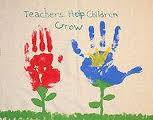 Curriculum. There's another one of those words that sound so easy to define, yet so complicated once you delve into the details. I believe that by all means, a school's curriculum must be geared to meet state and standards. But, I think it is equally important for teachers to be given leeway in how they manipulate the curriculum to reflect their own personality and meet the needs of their particular students.
Curriculum. There's another one of those words that sound so easy to define, yet so complicated once you delve into the details. I believe that by all means, a school's curriculum must be geared to meet state and standards. But, I think it is equally important for teachers to be given leeway in how they manipulate the curriculum to reflect their own personality and meet the needs of their particular students. What works for a teacher in a class one year may be a total flop when used with a class the next year. Each class is made up of individuals and they vary from year to year. The sign of an effective teacher, in my opinion, is one that can take the required curriculum and be flexible enough to think on his/her feet to be able to adjust on a moments notice to meet the needs of the class at that particular time on that particular day. What works one day may not work the next. As long as the state standards are being met, a teacher should have the ability to be creative on how he or she gets there.
Most teachers cannot pull off scripted lesson plans without sounding fake. Even very young students can sense when an adult is not being genuine. When a teacher isn't genuine, the students lose interest very quickly. Once you have lost the students' interest, classroom management becomes a problem. When classroom management becomes a problem, it makes for a miserable day for both the students and the teacher. It becomes a downward spiral from there. I can see were more "guided" lessons plans might be beneficial to a new teacher. But hopefully with a little bit of experience under her belt, the new teacher will gain the confidence to assess what is working for her students and what is not, and learn to adjust as needed.
 There are so many different ways to approach content. As long as the students are learning, a teacher should be encouraged to be creative in teaching methods. Creative teaching makes for happy students and happy teachers.
There are so many different ways to approach content. As long as the students are learning, a teacher should be encouraged to be creative in teaching methods. Creative teaching makes for happy students and happy teachers.









